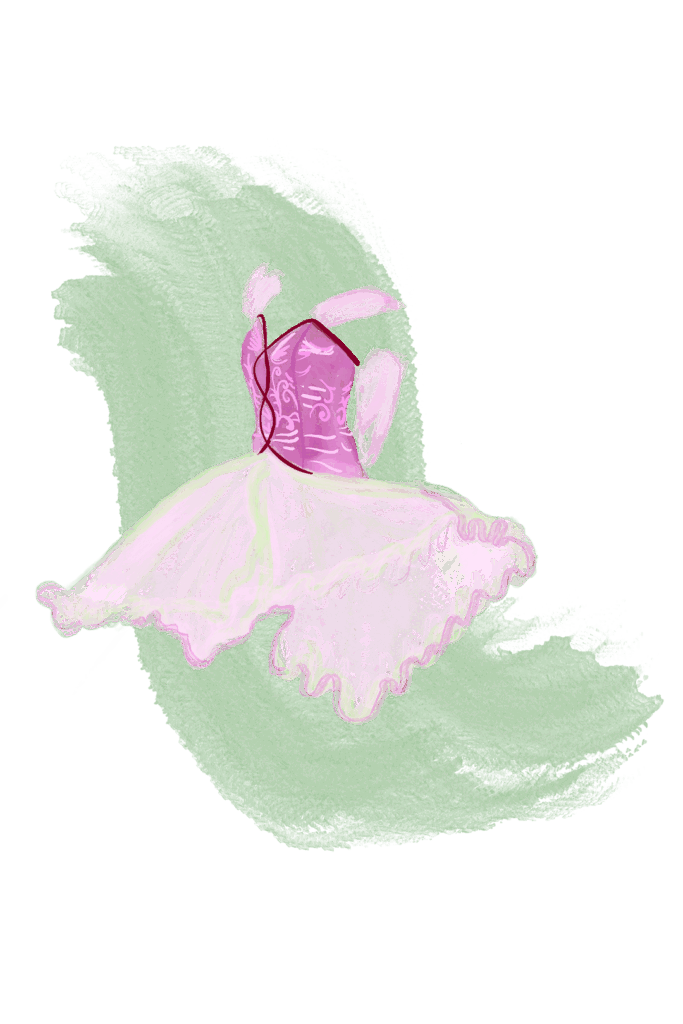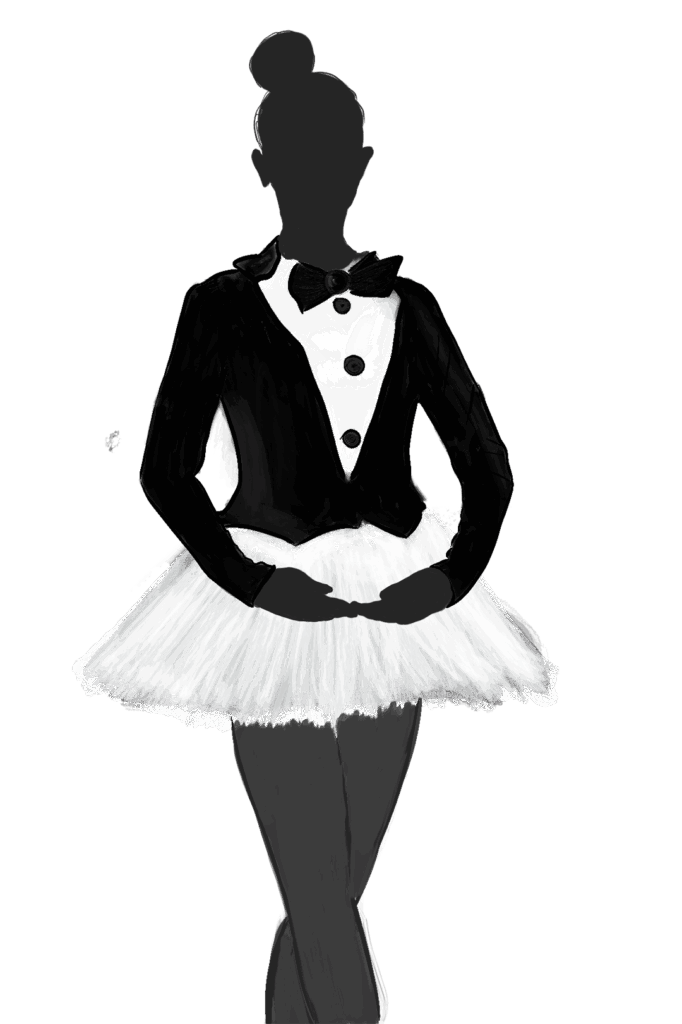Curtain call
Without dance, who was I? Improvisation showed me.
August 5, 2025 | story by Bruna Arnaes Baptista Moreira
illustration by Noor Sukkar
This story is from Atrium’s Spring 2025 magazine, which released April 2025.
The lights turn off, letting unrestrained darkness dominate the room. In seconds, it replaces every element that brought energy and agitation to the once-vivid auditorium. The blinding spotlight and floating specks of costume glitter and blasting classical music are all gone.
My eyes struggle to adjust to the abrupt change. All I can do is feel, slowly surrendering to every sensation my performer brain had previously ignored.
I feel the sharp ends of the 35 bobby pins holding my bun scratch against my scalp and the thick layer of foundation covering my face holding my smile in place. I feel the iron bars of my corset compress my ribs, preventing them from fully expanding for a deep inhale.
My legs itch from the tights. My feet throb in pain, probably from another broken nail. I try to spread my toes, sweaty and squished together, but it’s no use. They’re glued to the silicone protection I wear beneath my pointe shoes. I am physically paralyzed — frozen in time.
Though the choreography is complete and the music has stopped, my performance isn’t over. Something is missing.
I try to see through the barrier between me and the audience, the darkness interrupting our two-way communication. I have delivered my message, but I need a response. A reaction. An answer. Anything.

I can’t stop my heart from pounding in my chest. It isn’t from physical exhaustion — I have been trained to execute the one-minute-long solo without struggle — but fear. Uncertainty pulses through me in short breaths and shaking hands.
What if they didn’t like my performance? What if I just wasn’t good enough?
Nevermind.
The lights turn back on, and I see the audience rise to their feet, one by one. Then comes the sound. The one I know so well.
The applause grows exponentially, permeating the auditorium as I feel the spotlight shine on me again. Every dark corner is illuminated, every vacant aisle filled with noise, every doubt in my mind put at ease. Approval. The crowd is telling me I succeeded, and I internalize it.
I step to center stage and curtsy. My lips crack into a smile, a sign of relief first, then happiness.
I started dancing at 7. Since then, I have evaluated myself — not only as a dancer but as a person — according to external judgments. I was never talented enough, smart enough, cool enough or pretty enough until one of my dance instructors, school teachers, relatives or friends said so.
I looked in the mirror, searching for a reflection I couldn’t find. Unable to see myself through my own eyes, I did it through theirs.
Each day after rehearsals ended and the other dancers had left the studio, I stayed to practice my skills by myself. One evening, I decided to use the time to exclusively train pirouettes. I’d just been called out for missing my landing in class, and I couldn’t let it happen again.
Forty-five minutes of countless repetitions passed in the studio until, finally, I landed it: my first ever triple pirouette. It was fast, sharp and precise — the “perfect” pirouette.
I ran to the lobby, looking for the instructor who had corrected me earlier, begging her to give me another chance. We returned to the studio, where she awaited the perfection I had promised.
I spun once. I spun twice. I spun three times. But as I attempted to land the pirouette by transitioning my right foot from passé to fourth position plié, it slipped back into a split.

Suddenly, I found myself on the floor watching my instructor’s face flood with disappointment. Silent, she faked a smile before walking away.
I stayed there on the floor, feeling my genuine smile fade from my face.
Even when I wasn’t dancing, I internalized outside judgements and hid the traits I thought would scare away the applause. In school, I often found myself masking my emotions — an encore of the performance that became my life.
In seventh grade, I lost one of my best friends to a brain tumor surgery. I was in my room doing homework when I got the text saying she had passed away. Shortly after skimming the first couple sentences, I ran to the living room looking for my mom. I laid on her lap and cried myself to sleep.
The morning after, I wiped away any trace of my tears, covering my cheeks and my sadness with makeup. When it became nearly impossible to see through the mask I had constructed, I was ready for school. I decided to never express my pain again.
Months later, my friends and I went to the movie theater to see “Five Feet Apart.” Watching an on-screen depiction of death due to cancer ignited my internal suffering. Suddenly, the scar I had avoided touching for so long was wide open again, announcing itself unwillingly as tears ran down my cheeks. I felt the flames of months of suppressed grief all at once, and it burned.
It didn’t take long for me to notice my friends’ clueless expressions. For the first time, my mask had fallen, and my friends closely examined the stranger that had taken my seat.
I was a rare species observed by intrigued zoo visitors. No one attempted contact or intervention; they watched carefully from a distance, cautious of any unpredictable movement.
Unwilling to serve as their entertainment, I ran to the bathroom. My friends never directly asked me about it, and I never gave the explanations requested by their stares.
For about a decade, dancing had been my passion and performing my expertise — but neither show could last forever.
At 14, I was sitting next to my mom at the orthopedic office. Years of dance had weighed heavily not just on my mind but my body, resulting in a lumbar disc protrusion and eventually, surgery.
My mom and I had talked this over before walking into the room, and I had sworn to respect whatever recovery instructions the doctor recommended. But at this moment, I was starting to reconsider my promise.
I knew what he might say — that I could never dance again — but I didn’t know if I could take it.
My eyes followed the doctor as he rose from his spotless white chair with a certain difficulty and made his way to the opposite side of the room, steps dragging. I studied his face as he turned the viewer lights on and placed the MRI against it.
He inspected the image of my lower back. Time slowed.
Was that a twitch in his brow? A deeper inhale? A second of hesitation?
He turned around, his eyes searching for mine. When our gazes met, no words were needed. I could sense his apology brewing. There was the doctor’s answer. It was over.
What had been my life for so long became a piece of my past in seconds.
My thoughts, racing just moments earlier, slowed to a stop. I felt salty tears brimming in my eyes, then streaming down my cheeks — water that seemed to wash my identity away.
Sitting on that cold, hard chair, I closed my eyes and, for the last time, tried to visualize myself on stage. There I was, standing in the darkness again.
My eyes tried to adjust to the lack of light, and my breaths tried to slow their quickened pace.
I could feel the cold breeze from the strong air conditioner of the auditorium drying the sweat off my face.
My heart pounded against my chest. My ears pricked up for the audience’s response.
I waited for a sound, a reaction, an answer.
Nothing came.